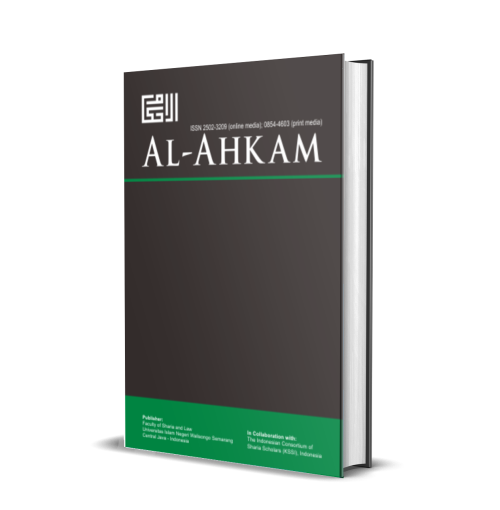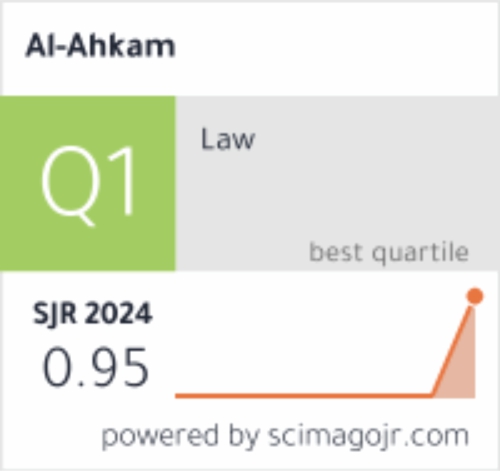Diat and Peace Money in the Crime of Culpable Homicide
DOI:
https://doi.org/10.21580/ahkam.2022.32.2.12413Keywords:
diat, forgiveness, peace, restorative justiceAbstract
Islamic Law and Indonesian Criminal Law place compensation as an essential part of criminal liability. The fundamental difference is that compensation is primary in Islamic law, while positive law is an alternative. This paper examines and compares the application of the theory of diat and compensation in the crime of culpable homicide. The writing is framed with a normative-empirical approach, with data sources from books and court decisions. The results of the study show three things: First, diat and peace are different conceptions. Diat refers to property given in exchange for a slain soul, while peace is given as a compensation fee and as an effort to forgive. Second, the amount of compensation in the diat is regulated in detail with a certain nominal. At the same time, positive law is an agreement considering the perpetrator's ability. Third, compensation in the diat is an inspiration for developing legal theories such as restitutive justice, which emphasizes the importance of forgiveness and reconciliation between two parties. Research suggestions so that the diat theory can be developed into modern law so that it can be an inspiration for lawmakers so that in its application, the diat theory can be a reason for the abolition of crimes, not limited to leniency.
Downloads
References
Adamson, Peter. Philosophy in the Islamic World in Context. Berlin: De Gruyter, 2019.
Alishahi Tabriz, Amir, Hossein Dabbagh, and Harold G Koenig. “Medical Ethics in Qiṣāṣ (Eye-for-an-Eye) Punishment: An Islamic View; an Examination of Acid Throwing.” Journal of Religion and Health 55, no. 4 (2016): 1426–32. https://doi.org/10.1007/s10943-015-0120-8.
’Awdah, ’Abdul Qādir. al-Tashrī’al-Jinā’ī al-Islāmī. Vol. 2. Beirut: Mu’assasah al-Risālah, 1987.
Badan Pusat Statistik. ‘Jumlah Kecelakaan, Korban Mati, Luka Berat, Luka Ringan, dan Kerugian Materi 2017-2019’. bps.go.id, 2020. https://www.bps.go.id/indicator/17/513/1/jumlah-kecelakaan-korban-mati-luka-berat-luka-ringan-dan-kerugian-materi.html.
Baderin, Mashood A. Islamic Legal Theory. London and New York: Routledge, 2017. https://doi.org/10.4324/9781315251721.
Burlian, Paisol. Implementasi Konsep Hukuman Qishash di Indonesia. Jakarta: Sinar Grafika, 2015.
Butt, Simon, and Tim Lindsey. Indonesian Law. London: Oxford University Press, 2018.
Dahlan, Moh., Zakiyuddin Baidlawy, and Sugiono Sugiono. ‘Gus Dur’s Ijtihād Paradigm of Contemporary Fiqh in Indonesia’. al-Ahkam 29, no. 2 (2019): 167. https://doi.org/10.21580/ahkam.2019.29.2. 4193.
al-Fayūmī, Aḥmad. al-Miṣbāḥ al-Munīr. Beirut: Dār al-Fikr, n.d.
Habieb, Sa’di Abu. Ensiklopedi Ijmak: Persepakatan Ulama dalam Hukum Islam. Edited by Sahal Mahfudh and Bisri Mustofa. Jakarta: Pustaka Firdaus, 1987.
Hallaq, Wael B. A History of Islamic Legal Theories. Cambridge: Cambridge University Press, 1997.
Hazairin. Tujuh Serangkai Tentang Hukum. Jakarta: Bina Aksara, 1981.
Hiariej, Eddy O S. Prinsip-Prinsip Hukum Pidana. Yogyakarta: Cahaya Atma Pustaka, 2016.
Husni, Ahmad bin Muhammad, Amir Husin bin Mohd Nor, Abdel Wadoud Moustafa Moursi El-Seoudi, Ibnor Azli Ibrahim, Hayatullah Laluddin, Muhammad Adib Samsudin, Anwar Fakhri Omar, Alias, and Muhammad Nazir. “Relationship of Maqasid Al-Shariah with Qisas and Diyah: Analytical View.” The Social Sciences 7, no. 5 (2012): 725–30. https://doi.org/10.3923/sscience.2012.725.730.
Jumantoro, Totok, and Samsul Munir Amin. Kamus Ilmu Ushul Fikih. Jakarta: Amzah, 2005.
Kamali, Mohammad Hashim. “Appellate Review and Judicial Independence in Islamic Law.” Islamis Studies 29, no. 3 (1990): 215–49. https://www.jstor.org/stable/20839999.
Kamali, Mohammad Hashim. Principles of Islamic Jurisprudence. Cambridge: Islamic Texts Society, 1991.
Kelsen, Hans. Essays in Legal and Moral Philosophy. Edited by Ota Winberger. Boston: D. Reidel Publishing Company, 1973. http://link.springer.com/ 10.1007/978-94-010-2653-6.
Khallāf, ‘Abd al-Wahhāb. ‘Ilm Uṣūl al-Fiqh. Kairo: Maktabah al-Da‘wah al-Islāmiyah Shabab al-Azhar, 1978.
Lyons, David. Ethics and the Rule of Law. Cambridge: Cambridge University Press, 1993.
Modongal, S. “Justice (Adi) through Forgiveness ('afw): Islamic Ethics for Qisäs as an Alternative to the Western Conflict Resolution Mechanism".” Islamic Quarterly 64, no. 2 (2020): 147–58.
Muhamad, Mohd Munzil bin, Ahmad Azam Mohd Shariff, Ramalinggam Rajamanickam, Mazupi Abdul Rahman, Anowar Zahid, and Noorfajri Ismail. “Qarinah: Admissibility of Circumstantial Evidence in Hudud and Qisas Cases.” Mediterranean Journal of Social Sciences 6, no. 2 (2015): 141. https://doi.org/10.5901/mjss.2015.v6n2p141.
Muslehuddin, Muhammad, and Yudian Wahyudi Asmin. Filsafat Hukum Islam dan Pemikiran Orientalis: Studi Perbandingan Sistem Hukum Islam. Yogyakarta: Tiara Wacana Yogya, 1991.
Osanloo, Arzoo. “Forgiveness Work.” In Forgiveness Work. New Jersey: Princeton University Press, 2020. https://doi.org/ 10.1515/9780691 201535.
Powell, Russell. “Forgiveness in Islamic Ethics and Jurisprudence.” Berkeley J. Middle E. & Islamic L. 4 (2011): 17. https://digitalcommons.law.seattleu. edu/faculty/117.
Rispler-Chaim, Vardit. Disability in Islamic Law. Leiden: Springer, 2007.
Rokhmadi. Hukum Acara Pidana Islam. Edited by Nazar Nurdin. Semarang: Lawwana, 2021.
Rokhmadi. Kritik Konstruksi Hukum Pidana Islam. Edited by Nazar Nurdin. 1st ed. Semarang: eLSA Press, 2019.
Rosseau, Jean Jacques. On Social Contract. Edited by Cole. New York: Dover Publications, 2003.
al-Shāfi’ī, Muḥammad Ibn Idrīs. al-Umm. Edited by Badruzzaman. Jakarta: Pustaka Azzam, 2015.
Shihab, M Quraish. Tafsir al-Misbah: Pesan, Kesan dan Keserasian al-Qur’an. Jakarta: Lentera Hati, 2002.
Syarifuddin, Amir. Ushul Fiqh 1. 5th ed. Jakarta: Kencana, 2011.
Wahid, Abdurrahman. “Nilai-Nilai Normatif dan Reaktualisasi Ajaran Islam: Sebuah Pengantar.” In Ensiklopedi Ijmak: Persepakatan Ulama dalam Hukum Islam. Jakarta: Pustaka Firdaus, 1982.
Yusuf, Hambali, Topo Santoso, and Nashriana Nashriana. ‘Permaafan dan Diat Alternatif Pidana Penjara pada Tindak Pidana Pembunuhan Biasa (Doodslag)’. Jurnal Hukum Ius Quia Iustum 28, no. 3 (2021): 481–504.
Downloads
Published
How to Cite
Issue
Section
License
By submitting an article to the journal, the author(s) agree to transfer the published article's copyright to the journal, which will act as the publisher. This means the journal will have the right to publish the article in various forms, including reprints. The journal will maintain the publishing rights to the published articles.
In line with the license, authors and third parties (readers, researchers, and others) are allowed to share and adapt the material. In addition, the material must be given appropriate credit, provided with a link to the license, and indicated if changes were made. If authors remix, transform or build upon the material, authors must distribute their contributions under the same license as the original.



